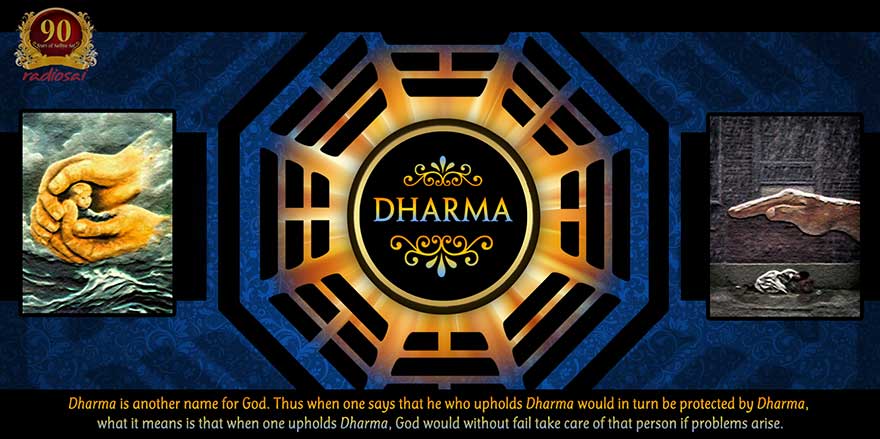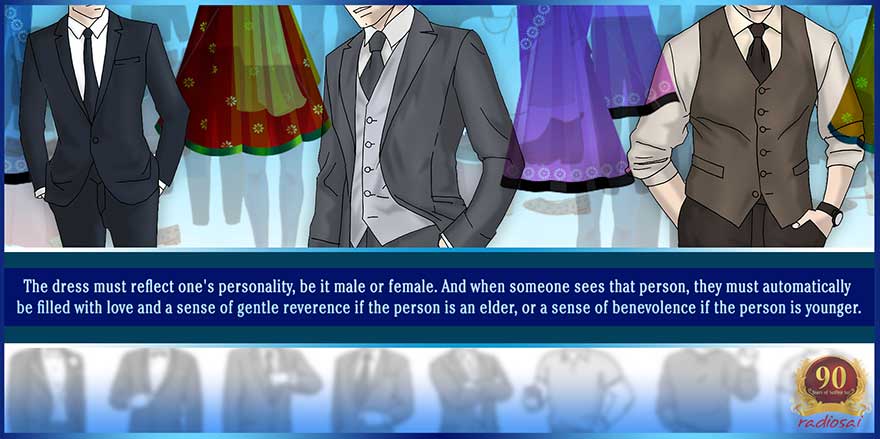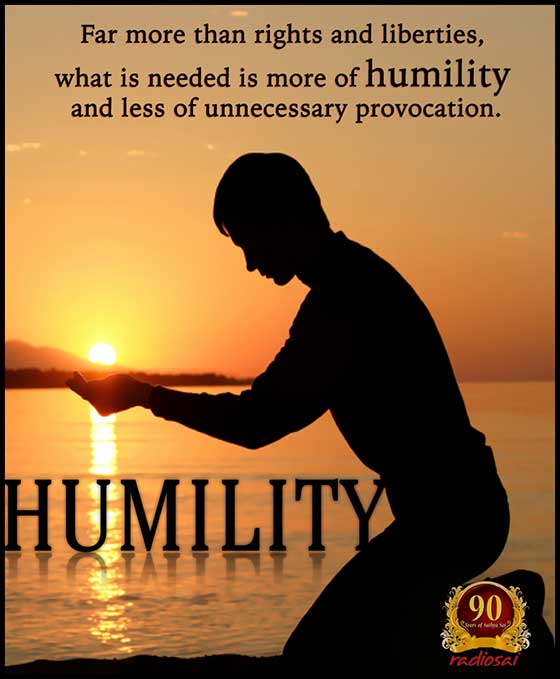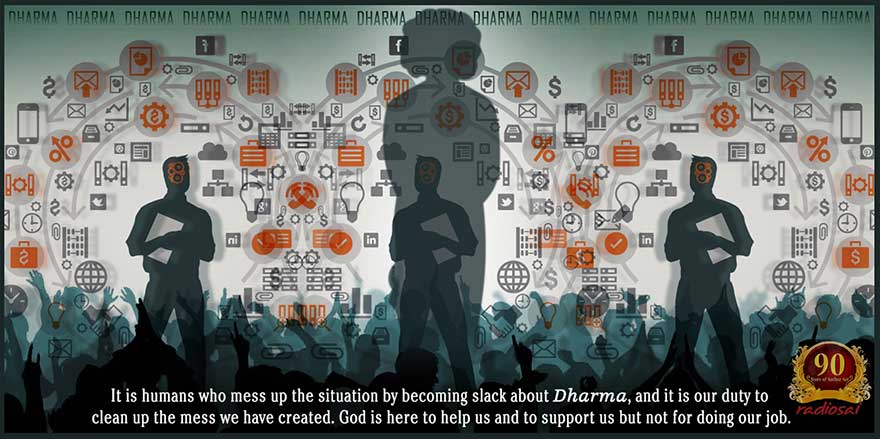|
|
| 'Like' us on Facebook | Follow us: |
Posted on: Dec 16, 2015
DHARMA VAHINI 09
Prof. G. Venkataraman
 |
Part 01 || Part 02 || Part 03 || Part 04 || Part 05 || Part 06 || Part 07 || Part 08
We live in times when more than one billion women, or one in three women, around the world do not have access to safe sanitation while one in ten women do not have access to clean water. Today dirty water kills more women than cancer. Half of India's 445 rivers are too polluted for drinking. Presently the richest one percent of the world own more than the rest of humanity combined. A Mumbai-based medical second opinion services center has revealed that 44 percent of suggested surgeries were needless. One third of the food produced in the world is wasted while 870 million go to bed without food everyday. Indiscriminate human action is showing up as environmental crisis like never before, and technology and globalization has made us so interconnected that acts of avarice in one corner of the world seems to affect the poor man in the other.
This does seem to be a real pickle we have got ourselves into. We generally tend to look for new solutions for new crises, and in the process we create new issues. Any reference to values, austerities or spirituality as solutions is often mocked at as regressive. In a sense it is not completely right to blame the younger generation for such contempt, for what has been lacking is the presenting of this time-tested wisdom in the modern context. We do teach our children that the solution for all problems lies in Bhagawan's message, but what we need to do is help them see that message in the background of the modern day happenings. And that is where the works and writings of Prof. G. Venkataraman have always stood out. With his immense knowledge of history and current affairs, and his passion to point out to the relevance of Bhagawan's message in this time and age and for the future, his writings always make for inspiring and interesting reading.
If we were to define in one phrase the problem we face in the world today, we could probably say 'decline in Dharma' - Dharma being a word pregnant with meaning and wisdom. No wonder Bhagawan wrote an entire book explaining this one value. 'Dharma Vahini', which was a series of articles written by Bhagawan for the Sanathana Sarathi and later compiled into a book, describes and dilates on the various nuances of Dharma. And Prof. Venkataraman's musings series on this Vahini presents in modern context this wonderful book's timeless wisdom. This series is the transcript with illustrations of the musings series aired on Radio Sai in 2007-08. Let us with prayers, join Prof. Venkataraman in this journey through the Dharma Vahini.
Loving Sai Ram, and greetings from Prasanthi Nilayam. We continue our study of Dharma Vahini, by picking up a few specific quotes from Swami’s book, and trying to understand those quotes as best as we can.
One point or remark that I often hear from devotees goes something like this: “Listen, all this stuff about Dharma that you are talking about goes back a long, long time. Life was very different then. This is the internet and globalisation age and these two phenomena have changed life for everyone on the planet beyond anything anyone could have imagined barely thirty years ago. That being the case, how can you apply something might have been valid four thousand years ago? Are you sure you have examined the applicability of those concepts in the first place?”
A good question, and since I hear this often, I did a bit of digging into Swami’s book and came up with the following statement.
The principles of Dharma will not change to suit the convenience of man. Dharma is immutable. Dharma persists as Dharma, then, now and forever. Of course, the practices and rules of applied Dharma might change according to changing causes; but, even then, those practices have to be tested on the basis of the Sastras, not on the basis of advantage.
I think Swami’s answer is loud and clear. Some of you might be disappointed to hear what Swami has to say, but before you jump to conclusions, I think we should first carefully study what Swami has said. What I mean is that there are two key points involved here. The first is the basic principle and the second is the practical application of the principle. What Swami is saying is that the principle cannot change, but where rules for practical application are concerned, there is scope for adaptation. And Swami Himself has given the lead in this matter on many occasions, in ways that are in fact unthinkable.
I mean take the chanting of the Gayathri Mantra. The scriptures of India strongly advocate the chanting of this Mantra, and in fact, Brahmins and Brahmacharis in particular, were in those days expected to go through a prayer routine that called for repeated chanting of this Mantra during three prayer sessions a day, once in the morning, once during midday, and once during sunset time. However, in the olden days, only Brahmins had the sanction to chant the Gayathri; women were not permitted, nor were members of other castes.
Now what did Swami do? He simply said: “Gayathri is a prayer to the Universal Mother. No one can be forbidden from chanting it. Every human being, whether man or woman, and no matter what his or her faith is, has the fundamental right to chant the Gayathri anytime, anywhere, as many times as the person wishes.” And He generously encouraged the chanting of the Gayathri and indeed the Vedas, not only by women but in fact by people of all countries, all races, and belonging to all faiths. This is thus a remarkable example of maintaining the basic principle but at the same time, adapting to changing times as required.
 |
Let me give an example of my own, which, I am sure would enable you to appreciate the argument even better. Take a simple matter like corruption. I am sure you would agree that corruption is against Dharma at ALL times; no exemption can be imagined or can be sought on any ground; that is absolutely clear. The fundamental point is that Dharma is an ABSOLUTE value, like Sathya also is. Absolute values always hold, they are Eternal – that is what Swami is saying and how can anyone take exception to that? Swami has made another important point which is that Dharma being absolute, it must be followed for its OWN SAKE, and not because it would fetch this benefit or that reward. It is like duty, which HAS to be performed, no matter what.
There is one other important point that Swami calls attention to. He says that these days, many people tend to feel that it is unfashionable to adhere to Dharma and try to defend their position by scoffing at some of the associated rituals that were meant for a different day and age. This, to use a phrase commonly used in America, is like throwing the baby out with the bathwater. Yes, certain practices might have outlived their utility for sure; but on that basis, can one decry the fundamentals? Can honesty and integrity ever be dispensed with or be practised selectively? How would we feel if we go to a well-known doctor expecting some honest advice and treatment for some ailment we have and then find ourselves taken for a ride? Just to assure you that I am not making all this up – I mean people giving up Dharma because of the fear that they might be considered old-fashioned, let me offer you a direct quote. This is what Swami says:
Nowadays, many educated persons have become afraid to stick firmly to Dharma, for it is being laughed at by their cynical friends; they have yielded to the crooked arguments of critics and sold their heritage for trivial returns.
I am sure that while most of you would readily accept that Dharma is an eternal value and that adherence to it is unavoidable, some might have reservations about the consequences that follow when Dharma is violated – I am referring to the Karmic aspects. And there might be others who would dismiss the notion that the one who upholds Dharma is protected by that same Dharma. Such people generally say, “This does not make any sense. Dharma is a concept, a principle. I agree it is a good principle and that it is desirable to adhere to Dharma; but to declare that it provides safety and acts like an insurance, defies rational logic.” Well, that is the way it might seem if one applies mere logic. But then, this kind of “legal” analysis overlooks a fundamental and crucial point, which is that Dharma is another name for God. Thus when one says that he who upholds Dharma would in turn be protected Dharma, what one really means is that when one upholds Dharma, God would without fail take care of that person if problems arise, since Dharma is God and God is Dharma – it is as straightforward as that.
 |
I know many might find it difficult to accept what I am saying, and that is precisely the reason why H2H has made it point to carry what we call Dharma-success stories. Please look them up; these are real-life stories, narrated by people in the corporate sector and how they faced great challenges while trying to be scrupulously honest and how Swami helped them get out of the jam. [Harnessing the Heart Series]
At this juncture, I would like to bring up the linkages between the fundamental principle and application once more. My point is simply this: We should not automatically assume that all practices based on Dharma become outmoded with time and automatically require to be abandoned or modified. Let me take a particular issue that I realize might possibly not go well with some of our younger ones. This relates to the matter of dress.
I shall begin this part of the discussion with a recall of something I read about five years ago in a Bengaluru newspaper. The item was a letter to the Editor by a young lady may be about twenty two years or so of age, who was visiting the Metro city on a small holiday trip, along with some of her friends; they were all from Gulbarga, a small town a few hundred kilometres to the north, and were students of a Medical College there. This student group was walking along Brigade Road, a prominent shopping area in Bangalore, gazing at the displays in the windows and what not, something that most tourists do. However, for this particular girl, the writer of the letter to the Editor, this was far from a pleasant experience. She said that all along, gangs of local youth, both boys and girls of roughly the same age, were teasing her and even hurling some kind of abuse at her. Why? Because she was dressed in a saree, that is why. This girl angrily asked in her letter, “What wrong was I doing by wearing a saree? This is the dress my grandmother wore, and also my mother. This is the dress millions and millions of women wear all over India. I was relentlessly teased for not wearing jeans and as skimpy blouse. Is it a crime to wear a dress that is native to this country, and a proud reminder of our tradition? What is going wrong with this country, when we cannot wear our own type of dress?” and so on.
 |
I raise this question because this brings to the fore issues that link abstract principle to practical matters in such a way, where sharp discrimination is required. What are the basic points and issues involved here? From the point of view of Vedanta, and that is also substantively what Swami also says, the points are as follows:
Dress is a must for all, but at the same time, it must be such as not to deflect the attention of others to one’s body, and one’s youthful charm in particular.
This is not to say that one must swing to the other extreme by trying to look like an ascetic; rather, dress, like the face and deportment, must reflect the personality of the person concerned, be it male or female. And when someone sees that person, the person who does so must automatically be filled with love and a sense of gentle reverence if the person is an elder, or a sense of benevolence if the person is younger. To put it more explicitly, in the Indian tradition, for men, all women other than the wife were mothers if they were older, even by a day, while all women younger were sisters. I remember how often late Mr. V.K. Narasimhan, who stepped into the shoes of Prof. Kasturi as the editor of Sanathana Sarathi often used to tell me that this was the most wonderful aspect of ancient Indian culture.
All the above leads us to an important point which is that principles often lead to certain practices which become a part of the culture. Now the word culture must be understood properly; Swami says that culture means refinement; and a refined person conducts himself or herself with dignity, especially in public; I mean you can’t have the President of country acting like a joker, can we? Thus, observance of Dharma sometimes imposes behavioural and other such norms on us, which we must respect.
I am aware that all this would not cut much ice with many of today’s younger generation, leading to wry smiles at best, and fury at the worst. But then consider the facts. These days, within a short span of about five or six years, there has been a huge cultural swing all over India, sweeping tens of millions, thanks to a massive exposure to “modern influences” in which the Media is heavily involved. Many would like to brand me as a Media basher, but before you do so, please hear me out.
The pro-change people [and this includes the Metro elite who are in 'closer touch' with world trends on all things including fashions, food, etc.] argue, “We want to be trendy. If you do not like what we are doing, then shut your eyes. We have a right to our space,” etc. These days when freedom is the buzz word, such arguments are eagerly lapped up, and there are all kinds of groups to actively defend such rights. OK, people claim they have rights, and let us suppose that they do have it and that those who do not like it should close their eyes, etc. But then, as is only to be expected, there are consequences for sure. However, those consequences are not liked by the avant-garde crowd, and they protest vehemently. Let me be more specific.
Some months ago, the New Year’s night revelry in one of our big metros, attracted a lot of guests, including many women from overseas [a good many of them being NRIs]. And they were dressed for the occasion shall I say, which is a polite way of saying the dress was far from suitable for walking on roads, especially at night. And on the roads, were many youth, most of them from the city slums and rural areas, who are not well up on the etiquette expected of city youth, well up on trendy things. Inevitably, there were many cases of improper behaviour by the rowdy elements stalking the streets, to put it mildly, all of which led to a huge furore in the English-language press. Some people went to the Police and complained and some even went to the Chief Minister of the State. Both officials expressed regret over the incidents. When those who protested demanded to know why the Police were so negligent in providing protection for late night stroller, the officials said, “On revelry nights like this, most of the Police force is out looking for drunken drivers. Lately, there has been a sharp increase in drunken driving and in fact, many have been killed as a result. On nights like this, we have to be extra vigilant, and that is why we could not deploy sufficient number of cops to do the beat. This is a huge city and how many places can we cover?”
 |
The young man and the socialite who went with him to complain felt bitter about the response, following which, this young man, highly educated and all that, wrote a blog, roundly abusing villagers and their total lack of culture, their inability to control themselves etc. Without defending the perpetrators of indecent behaviour, I would at the same time like to make a few remarks. Firstly, the furious and indignant writer did not make any attempt to understand the psychology of the slum youth. They do not have the exposure to the sophisticated “value system” of the educated youth that allows one to walk around in erotic and provocative dresses but at the same time demands that they remain “untouched”.
I know I would be severely criticised for this, but there IS a thing called reflection, reaction and resound. If a society becomes very permissive and allows a lot of violence to be shown constantly in TV and films, and further allows violence to be built in heavily into every single video game, then can one expect the people to remain unaffected and go around like Mahatma Gandhis? Similarly, if in the name of liberty, freedom and so on one claims the right to print even in newspapers, pictures that are at best in poor taste but often border on the sheer vulgar, when courts rule that the internet can carry porno, etc., then society has to pay the price in terms of promiscuity and all its consequences, that hardly need to be repeated here.
 |
This is precisely where Swami’s teaching assumes great importance. He says that whatever we as individuals do, we must take care to see that our actions do NOT disturb Society in any way. However, these days, in the name of freedom of expression, personal liberty etc., people claim all kinds of rights. At the same time these very same people, become very fussy about some things, like carbon footprints etc.
I do not know how you feel but I am of the opinion that one cannot dial one’s preferences claiming to act in the name of freedom of expression, etc., as and when convenient, and demand the right to do some things even if it hurts the sensitivities of others. Sometimes, this business of demanding rights goes a bit too far I think. Perhaps I could give some examples to explain what I mean. Sometime ago, a leading artist did some paintings that showed some of the goddesses regularly worshipped by Hindus with scant covering. This raised a huge protest, as is only to be expected. But the 'liberated' and art-loving elite vehemently condemned the protests, and these protests were duly given a lot of prominence in the English press and English media in general, since it is packed with liberated souls who are champions of individual liberty, freedom of expression etc.
All these self-proclaimed rights are an extension of what is claimed in many other countries where artists feel they can draw and paint pictures that unquestionably would infuriate Muslims. Yet they insist on doing what they do, claiming rights in the name of freedom of expression etc. I really do not know who gives or grants these rights, but I would like to ask a simple question: “When one knows for sure that large numbers of people would feel very much hurt, why then do something that is sure to offend people for whom the distorted depiction of things they hold dear?” I do not understand how they can say, “I have the right to do this and that and if you protest it simply means you have not evolved and understood anything about fundamental rights etc.”
Well they can claim all the rights and cry from rooftops about their rights, but people being what they are, it is to be expected that some of the protestors in the fringes who cannot be expected to be 'reasonable' would cross limits of tolerant behaviour and ugly consequences might ensue. Far more than rights and liberties, what is needed is some more of humility and less of unnecessary provocation.
 |
Here is another simple example where there is unnecessary provocation. At first sight, it does not seem like an issue connected with Dharma, but something to do with current trends, compulsions and 'necessities'. Yet, as I shall argue, there is an undercurrent of Dharma. It is connected with an order issued by the Vice Chancellor of one of our universities who said that students should not bring cell phones to class. Boy was there a furore?! But what was significant was that the issue was made into a national controversy by the media; for the media the issue was like a huge ice cream treat. Everyone went hammer and tongs for the VC. What the VC said was, “We are merely saying that you should deposit your cell phones when entering the class. We cannot have students carrying them into the class.”
To me the VC’s order seems reasonable, but neither the students nor the parents would have anything of it. I mean, it is a fact that while the class is in progress, students are known to keep busy sending SMS messages and so forth. The VC was saying that students come to class for learning and they should focus on that and that alone. Prompted by the media, parents who went on camera fumed, “How can we stay in touch with our children? Suppose there is an emergency?”
Frankly, I did not at all find any of the many arguments trotted out meaningful or valid. I mean when I was a student, there were no such things as phones even and I don’t think I was the worse for it. Of course, people say, “Come on you old man, things are different now.” I agree, but I gather the purpose of education has not changed I believe.
If I were to look at it in terms of Dharma, duty, culture and tradition – and by the way, culture and tradition cannot be entirely disconnected from Dharma, as some would like to have it – knowledge is Goddess Saraswati and learning is a sacred duty for a student.
That being the case, I strong feel that not only does the cell phone have no place in the class, but equally important is the matter of coming to class properly dressed. Incidentally, there was equal furore with respect to dress code prescribed but that I shall not go into that right now. As for the argument of parents wanting to get into touch with their children in an emergency, why can’t the parent concerned just phone the college office and communicate the emergency?
I think it is time to wind up and as a parting comment, let me say that adherence to Dharma is 'not' optional; it is a must for all, and no one, no one, period, is exempt.
 |
I do hope you do appreciate that this series is presented specifically to help all of us make a strong commitment to Dharma. Let us remember that God comes down in human form to help restoration of Dharma to its rightful place. And when God comes, it does not mean that we all sit back and wait for God to do all the fixing while we cheer like enthusiastic spectators. It is humans who mess up the situation by becoming slack about Dharma, and it is our duty to clean up the mess we have created. God is here to help us and to support us but not for doing our job. By the way, this trend started a long time when Swami came as Krishna. Remember, Krishna did not fight in the Mahabharatha war; instead, He lent support. God is here once again to do that. The question before us is: Do we want to do anything really serious about putting Dharma back on the glorious pedestal that is its rightful place, or do we think God would take care of it and all that we have to do is to watch and cheer, like we do while watching a sports game?
Think about it. Thank you, Jai Sai Ram.
- Radio Sai Team
What do you think about this article? Please let us know by writing in to h2h@radiosai.org or you may leave your thoughts in the comments section. Do not forget to mention your name and country.
| comments powered by Disqus |







